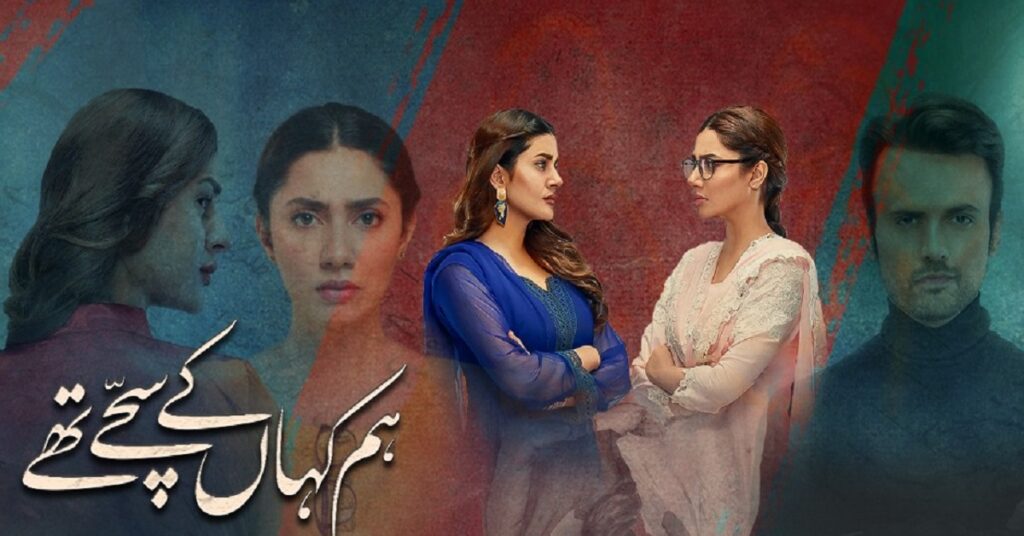A drama written by Umera Ahmed is always something highly anticipated, because there is one thing associated with Umera Ahmed’s name – quality. Adding to the excitement surrounding “Hum Kahan Kay Sachay Thay” is the star cast, marking Mahira Khan’s return to the small screen after six years, along with Kubra Khan, who also lends her name to select projects. Usman Mukhtar is the sole hero of the show, playing a character caught between these two women and their internal dilemmas. Directed by the immensely talented Farooq Rind, the first episode of “Hum Kahan Kay Sachay Thay” takes off at full force, drawing the audience in immediately to its dark tale.
In episode one, we are introduced to young Mehreen, Mashal and Aswad, cousins who are also playmates. Aswad lives in Kuwait and visits Mehreen and Aswad have a special attachment to each other and Mashal grows up feeling left out, not only due to their relationship, but also her own mother’s (Zainab Qayyum) nagging and constant comparisons with Mehreen. While Mehreen’s life looks perfect to the family on the outside, it’s soon revealed through Rabia (Laila Wasti) that her husband, Mansoor (Omair Rana) has left them in ruins. Mansoor has fallen down the wrong path, taking drugs and stealing not only his wife’s jewelry to pay debts, but also stealing from his workplace. Rabia’s decision to leave Mansoor leads to his death, something which haunts Mehreen into adulthood.
We then see grown up Mehreen (Mahira Khan), a strong young woman who is forced to fend for herself due to her father’s death and mother’s abandonment (remarriage). Mehreen may have had a rough life, but she works hard, studies hard, has good friends (and a potential romance?) and even participates on the debate team. She is living a visibly fulfilled life. We also meet grown up Mashal (Kubra Khan), a vindictive, manipulative young woman who does everything in her power to make Mehreen’s life hell (like stealing her inhaler) – but is incredibly broken on the inside. She may have everything Mehreen doesn’t, but she lives a very different life.
Quite honestly, there’s one performance that steals the show in the first episode and it belongs to Omair Rana as Mansoor. This man is a star performer. While Mansoor could have easily been painted as a character to despise, Omair Rana puts his heart and soul into bringing Mansoor to life – a man who has landed in a mess and is no longer reliable, but still loves his daughter and fears losing his family. His performance is absolutely wonderful and if there’s any complaint with the show so far, it’s that we won’t be seeing more of Mansoor.
Coming to our leads, Mahira Khan is wonderful to watch on-screen, as always, and this time isn’t any different. Mahira has refrained from making Mehreen the typical, quiet, scared heroine that we’ve grown accustomed to. Despite everything she has endured, there’s a strength to Mehreen, a resilience that allows her to face the world with her head held high. Mahira Khan is always praise-worthy and she immediately wins the audience over within the first moment she appears on screen. There’s a quiet brilliance to Kubra Khan’s performance as Mashal that deserves praise. Mashal may have been raised with two parents and hasn’t seen the devastation that Mehreen has experienced – but there’s an inherent sadness within Mashal. There are slight touches that Kubra puts into her performance, such as the underlying sadness Mashal experiences after her “mean” moments, that elevate the character to a different level. Usman Mukhtar has approximately five minutes in the first episode, playing the part of the foreign return cousin as would be expected – Usman is a great actor, but he isn’t given much scope to perform yet, the ladies stealing the show this time around. Credit must also be given to the wonderful (female) child actors, who are wonderful – especially Tehreem Ali, who is proving to be quite the actress, building an impressive body of work.
Overall, what really works for “Hum Kahan Kay Sachay Thay” is the depth that has been given to these characters, credit for which should go to Umera Ahmed. The way these characters have been written allows the viewer to truly feel for them, even characters like Mansoor and Mashal, who are not “good” characters – but are flawed individuals with layers. The direction by Farooq Rind is wonderful, the pace engrossing and, quite honestly, this show is transporting the audience back to the “good old days” of Pakistani dramas. One can only hope this drama retains this pace, this level of acting and this quality of writing. If it can, this could be on its way to become a modern classic.
